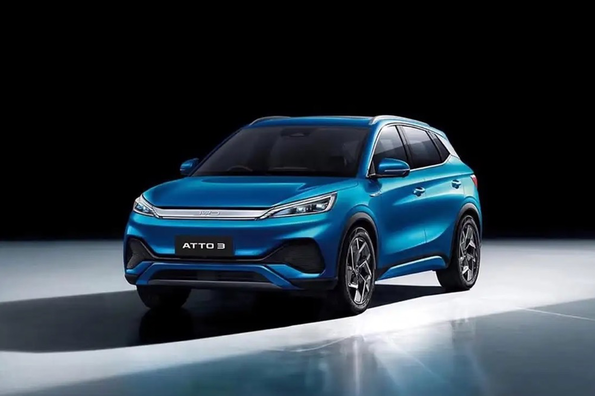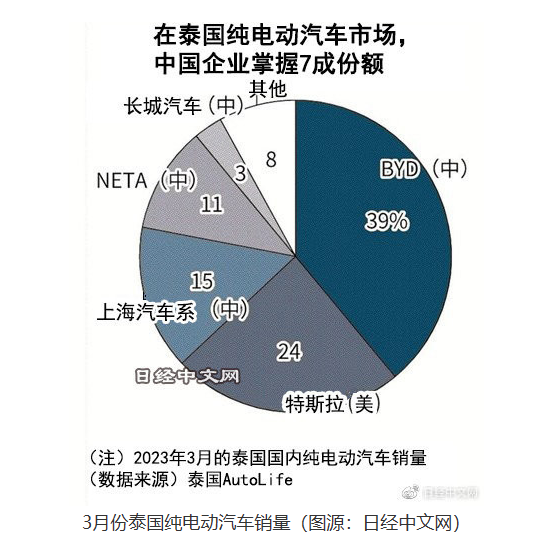Home >Technology peripherals >It Industry >Chinese pure electric vehicle manufacturers have achieved success in the Thai market, accounting for more than 70% of the market share
Chinese pure electric vehicle manufacturers have achieved success in the Thai market, accounting for more than 70% of the market share
- WBOYWBOYWBOYWBOYWBOYWBOYWBOYWBOYWBOYWBOYWBOYWBOYWBforward
- 2023-06-14 15:17:27977browse
China’s pure electric vehicle (EV) manufacturer is actively expanding its business into the Thai market, this is news on June 14. According to the editor's understanding, Chinese companies currently account for 70% of Thailand's pure electric vehicle market, far exceeding Japanese companies in the hybrid vehicle (HV) and fuel vehicle markets, with the latter having almost no presence in this market. In March this year, Toyota's main pure electric vehicle bZ4X sold only 2 units, and Nissan LEAF (named "Leaf" in China) sold only 6 units.
According to the editor's understanding, at the "2023 Asia Future Mobility Exhibition", a new generation automobile forum held in Bangkok in mid-May this year, SAIC's executives took the stage as a panellist to speak, expressing their hope to position Thailand A hub for pure electric vehicle production. To this end, SAIC will establish a joint venture with Charoen Pokphand Group (CP), Thailand's largest consortium. Sentences that need to be rewritten: SAIC has delivered 10,000 pure electric vehicles in the Thai market, making it one of the first large Chinese car companies to enter the Thai market. Rewritten sentence: SAIC is one of the first large Chinese car companies to enter the Thai market and has delivered 10,000 pure electric vehicles in the market.

In addition, starting from 2022, the Thai government will provide a pure electric vehicle sales subsidy of up to 150,000 baht (approximately RMB 31,000) on the condition of localized production. . Among manufacturers that fully meet a series of subsidy conditions, BYD performed well. According to data from Thailand’s AutoLife, a professional automotive media, sales of pure electric vehicles in Thailand reached 6,262 units in March this year, a year-on-year increase of 9.7 times, setting a new high. Among them, BYD ATTO 3 accounts for nearly 40% of the market share.
In addition to BYD's steady progress in the Thai market, Changan Automobile also announced in April this year that it will build a new factory in Thailand focusing on pure electric vehicles. The investment will reach 9.8 billion baht and is expected to be completed within a few years. The initial annual production capacity of the factory is expected to be 100,000 vehicles, and it will produce vehicle batteries and other products.

In 2020, Great Wall Motors acquired General Motors' (GM) factory in Thailand to enter the Thai market. They intend to invest 22.6 billion baht in the factory to renovate it and plan to start local production as early as 2024. In addition, it is reported that Chery Automobile and Geely Automobile have also shown interest in entering the Thai market.
In general, Chinese pure electric vehicle manufacturers are making their mark in the Thai market. By taking full advantage of the Thai government's subsidy policy and localized production, they accelerated their development in this market. As more Chinese car companies enter the Thai market, the share of pure electric vehicles in the market is expected to continue to rise.
The above is the detailed content of Chinese pure electric vehicle manufacturers have achieved success in the Thai market, accounting for more than 70% of the market share. For more information, please follow other related articles on the PHP Chinese website!
Related articles
See more- Meng Wanzhou talks about taking office as rotating chairman: Huawei is a collective leadership, not an individual succession
- Hydrogen production and separator development trends under the global hydrogen energy arms race
- Counterpoint Research: 2022 is a milestone year for the global eSIM ecosystem, with more than 260 operators supporting eSIM
- Google sued by publishers in UK for £3.4 billion
- Making mobile phones like making cars: Meizu has changed! Finally taking off?

